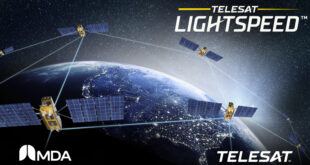By Steven Freeland, Western Sydney University, Australia,
and David Kuan-Wei Chen, McGill University, Canada

For over four months, we have been in the grip of the Novel Coronavirus (SARS-COV-2), which has spread to virtually every continent on Earth. Despite the best efforts of governments and people around the world, the infections and fatalities, and the economic and social consequences, are expected to linger for years to come.
The coronavirus has raised serious questions about our ability to detect, respond to and contain a pandemic outbreak on Earth. As humanity begins to venture further and establish a more permanent presence in outer space, real and pressing issues arise as to how to respond to a pandemic in space, or a virus originating from space.
Viral Space Health Risks
Leaving aside the side-effects of weightlessness and radiation exposure, recent research has demonstrated that space habitation may reactivate zoster viruses that cause herpes, shingles and chickenpox. Left untreated, these viruses may result in nerve damage, permanent vision and hearing loss, or even death.
To date, the only known “mass” infection in space occurred during the 1968 Apollo 7 mission, when all three crew members developed severe respiratory infections. However, there is always the risk of new infection, as highlighted by the possible pre-launch exposure of the current crew of the International Space Station to a Russian official who has subsequently tested positive for the coronavirus. Confined to a spacecraft, and with the lack of access to fresh rations to boost the immune system, viral diseases spread at a rapid rate and can be exceedingly difficult to overcome. The spread of the coronavirus onboard several cruise ships demonstrate just how dire an outbreak in a confined environment can be.
Space operators and agencies, like NASA, routinely quarantine astronauts before lift-off. Even so, there is no global standard on how to respond to a contagion in space. The closest may be the Planetary Protection Policy of the Committee on Space Research (COSPAR), which deals with minimising the biological hazards posed by extra-terrestrial matter carried onboard a spacecraft returning from space. There is nothing on identifying and controlling an outbreak in space.
Global Health Governance
At the heart of global health governance – on Earth – is the Geneva-based World Health Organization (WHO). This UN specialised agency is mandated to direct and coordinate efforts to ensure the “attainment by all peoples of the highest possible level of health” and prevent and control the spread of disease.
Prompted by the 2003 SARS outbreak, the WHO’s International Health Regulations (IHR) were revised to streamline the global response to a “public health emergency of international concern”. The IHR lay down obligations for the reporting and notification of emerging diseases. They also serve as the framework under which States alert and share with the international community any new public health risk, which may be the result of a natural occurrence, accidental or deliberate use of biological and chemical agents, or radio-nuclear material that affect health.
Space Law and Global Health
The IHR do not specifically address outer space. Even so, the Regulations would cover the pre-launch phase of a human space activity and would also apply to the detection and reporting of events detrimental to public health after returning to Earth. The IHR oblige States to inform the WHO of a public health risk identified outside their territory that may cause disease to spread, which may apply to risks discovered elsewhere, including in space.
Turning to space law, the UN space treaties do not specifically address matters of public health. The 1967 Outer Space Treaty does contain various obligations of relevance for spacefaring States, and by default are applicable to all space actors, in relation to a potential health risk. Article IX provides States must explore and use outer space, including the Moon and other celestial bodies, with “due regard” to the corresponding interests of other States. Arguably, a viral outbreak during a space activity, or the discovery of deadly pathogens carried on spacecraft or materials returned to Earth would be of genuine concern and interest to all. Echoing the COSPAR Policy, Article IX further provides that the study and exploration of space and celestial bodies must avoid harmful contamination and adverse changes in the environment of the Earth as a result of the introduction of extra-terrestrial matter.
The 1968 Rescue and Return Agreement requires States to share information on “conditions of distress” that may affect the personnel of spacecraft. Again, a viral outbreak in space would arguably qualify as such distress. Article 5 of the treaty obliges States to eliminate “possible danger of harm” if a returning space object (or its component parts) “is of a hazardous or deleterious nature”. The recently adopted Long-Term Sustainability Guidelines also contain various standards in relation to the protection of public health and the environment.
When Health Law and Space Law meet
Immediately after the launch of Sputnik-1 in 1957, the Committee on the Peaceful Uses of Outer Space recognised the possible role the WHO could play in identifying and addressing “medical or health problems associated with space exploration and travel”.
Despite its shortcomings, the WHO and its IHR provide the only global policy and legal framework to unite the world to deal with any future global public health emergency. As humanity increasingly ventures into space, and with the potential of long-term habitation in space and on celestial bodies on the horizon, the world must be cognizant of a possible pandemic occurring in space, or the risks of a pathogen piggybacking on objects or personnel returning from space.
A global identification, notification and response framework, with clear-cut obligations and guidelines for States and space operators, is essential for the long-term sustainability of space activities. At the forefront of this must be an independent and effective institution with the authority and resources to act to prevent a global pandemic and catastrophe. Whether in space or on Earth, there is no other way to proactively and pre-emptively protect human beings than through coordination, cooperation and common action.
The global health and space law regimes, as well as the experience of space agencies and experts specialising in space medicine, should be carefully analysed to find synergies that will help the international community prepare and respond to a global health emergency.
2020 will forever be associated with an overwhelming humanitarian crisis and a near-complete shutdown of modern civilisation as a result of the delayed and uncoordinated response to a potent viral threat. This experience is a valuable lesson for future generations residing on Earth, but also increasingly in outer space.

Steven Freeland is Professor of International Law at Western Sydney University, and also holds Visiting or Adjunct positions at Universities in Vienna, Toulouse, Montreal, Hong Kong, London and Copenhagen. He is a Director of the International Institute of Space Law, and a member of the Space Law Committees of the International Law Association and the International Bar Association. He has advised various Governments around the world on issues related to the national and international regulation of space activities and the development of a national space-industry strategy.

Mr. David Kuan-Wei Chen is currently the Executive Director of the McGill Centre for Research in Air and Space Law, and a Lecturer at the Faculty of Law of McGill University. He is also the Managing Editor of McGill Manual on International Law Applicable to Military Uses of Outer Space (MILAMOS).





